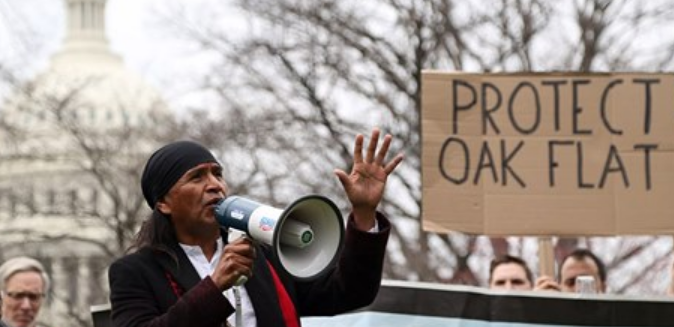
- Details
- By Levi Rickert
The 9th U.S. Circuit Court of Appeals issued an emergency injunction on Monday, temporarily blocking the Trump administration’s plan to transfer Oak Flat—a sacred and ecologically sensitive area in Arizona—to a private mining company. The decision comes as three separate lawsuits challenging the controversial land exchange continue to move through the courts.
Without the injunction, the federal land—located about 40 miles east of Phoenix—was set to be handed over on Tuesday to Resolution Copper, a subsidiary of global mining giants Rio Tinto and BHP. Tuesday, Aug. 19, marked the 60-day deadline following the U.S. Forest Service’s release of a revised environmental impact statement for the proposed copper mine at Oak Flat, a 2,200-acre site east of Phoenix. The deadline would have allowed Resolution Copper to assume control of the land—if not for the 9th Circuit Court’s last-minute injunction blocking the transfer.
“Tribes have been on these lands now called Arizona since time immemorial. Over the decades, we have strived to successfully provide for the health and welfare of our people while maintaining our status as sovereign nations,” said Maria Dadgar, executive director of the Inter Tribal Association of Arizona.
“We believe that the health of our people correlates with the health of the land, the water and the environment that surrounds us," Dadgar said. "We are hopeful with the news from the 9th Circuit Court of Appeals and welcome the opportunity to make our case for the continued protection of Oak Flat.”
In June, U.S. District Judge Dominic W. Lanza issued a 60-day pause on the land exchange while two lawsuits were under review. However, last Friday, he declined to extend that stay, paving the way for the transfer to proceed on August 19. In response, the San Carlos Apache Tribe, conservation and recreation organizations, and the Inter Tribal Association of Arizona filed immediate appeals. A separate lawsuit brought last month on behalf of Apache women and girls also requested an emergency halt to the exchange.
“We’re thankful the court has hit pause on this ill-conceived land swap that would devastate Oak Flat and all that makes it unique,” said Sandy Bahr, director of the Sierra Club’s Grand Canyon Chapter. “This gives us a critical window to continue our work to protect the area’s lands, waters, wildlife, and cultural heritage.”
The proposed land exchange would hand over more than 2,400 acres of federal public land to Resolution Copper for the development of a massive underground mine. Opponents argue the project would permanently destroy Oak Flat, a site of immense spiritual and cultural significance to the San Carlos Apache and other Tribes.
“The appeals court rightly recognized the gravity of the issues at stake,” said Roger Flynn, an attorney representing the groups challenging the land exchange. “There’s simply too much to lose to let this reckless giveaway of our public lands proceed unchecked.”
Beyond its cultural significance, Oak Flat is also a vital ecological area, home to threatened species like the ocelot and Arizona hedgehog cactus. The region provides critical habitat, recreational opportunities, and ecological value that opponents argue would be irreparably harmed by mining operations.
More Stories Like This
Gwich'in Tribal Governments Submit Comments Challenging Fish and Wildlife Service's Inadequate Environmental Review of Arctic Refuge Snow RoadRappahannock Tribe Challenges 9M-Gallon Water Plan
Feds release draft long-term plans for Colorado River management
Apache Leader Walks 60 Miles to Court Hearing That Will Decide Fate of Sacred Oak Flat
Rappahannock Tribe Raises Sovereignty and Environmental Concerns Over Caroline County Water Permit
Help us defend tribal sovereignty.
At Native News Online, our mission is rooted in telling the stories that strengthen sovereignty and uplift Indigenous voices — not just at year’s end, but every single day.
Because of your generosity last year, we were able to keep our reporters on the ground in tribal communities, at national gatherings and in the halls of Congress — covering the issues that matter most to Indian Country: sovereignty, culture, education, health and economic opportunity.
That support sustained us through a tough year in 2025. Now, as we look to the year ahead, we need your help right now to ensure warrior journalism remains strong — reporting that defends tribal sovereignty, amplifies Native truth, and holds power accountable.
 The stakes couldn't be higher. Your support keeps Native voices heard, Native stories told and Native sovereignty defended.
The stakes couldn't be higher. Your support keeps Native voices heard, Native stories told and Native sovereignty defended.
Stand with Warrior Journalism today.
Levi Rickert (Potawatomi), Editor & Publisher


